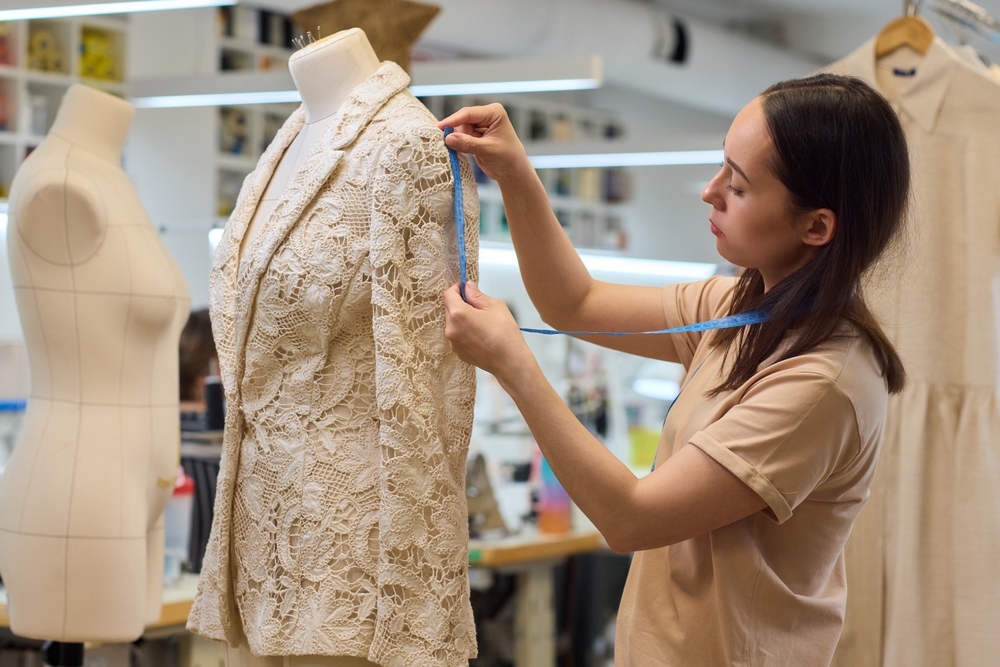Unleash Your Creativity with a Fashion Degree
A Fashion Degree gives you the knowledge and skills needed to succeed in the ever-evolving world of fashion. Study design, textiles, fashion history, and trend forecasting to build a foundation for a career in fashion design, merchandising, or production. Whether you aim to create your own brand or work for industry leaders, this degree opens doors to a dynamic and stylish career.

Comprehensive Courses and Degree Opportunities
Fashion education offers various pathways tailored to different career goals and interests. Most fashion schools provide bachelor’s degree programs in fashion design, fashion merchandising, fashion marketing, and textile design. These four-year programs deliver comprehensive education covering both creative and business aspects of the industry.
For those seeking specialized training, associate degrees and diploma programs offer concentrated curricula that can be completed in two years or less. These programs typically focus on practical skills like pattern making, sewing techniques, or fashion illustration. Many institutions also offer master’s degrees for advanced study in specialized areas such as sustainable fashion, luxury brand management, or fashion entrepreneurship.
Online programs have also emerged as flexible alternatives for students who cannot commit to full-time on-campus education. These digital learning environments provide access to industry expertise regardless of geographic location, making fashion education more accessible than ever before.
Innovative Training Programs
Modern fashion education extends beyond traditional classroom learning to provide hands-on experience crucial for industry success. Studio-based learning remains the cornerstone of design programs, where students develop technical skills in sketching, pattern making, garment construction, and digital design. This practical approach ensures graduates can translate creative concepts into wearable garments.
Industry partnerships enhance educational experiences through guest lectures, workshops, and real-world projects. Many programs collaborate with fashion brands to create briefs that simulate professional assignments, allowing students to build portfolios of work that addresses actual market challenges. Internship programs further bridge the education-to-career gap by placing students in professional environments where they can apply classroom knowledge and develop workplace skills.
Technology integration has revolutionized fashion training programs. Students now learn industry-standard software for digital design, 3D modeling, and virtual prototyping. These technical competencies are increasingly valuable as the industry embraces digital transformation in design processes, production methods, and retail experiences.
Strong Career and Compensation Growth
The fashion industry offers diverse career paths with promising growth trajectories. Design roles remain highly coveted, with fashion designers earning a median annual salary of approximately $75,810 according to recent industry reports. However, the breadth of opportunities extends far beyond design positions.
Fashion merchandising and buying roles offer substantial earning potential, with experienced professionals commanding salaries between $60,000 and $125,000 depending on the company size and market position. These positions combine creative insight with business acumen, requiring professionals to balance aesthetic considerations with commercial objectives.
Marketing and public relations specialists in fashion typically start around $50,000 annually, with senior positions reaching six figures at prestigious brands. These roles have expanded significantly with the growth of digital marketing and social media, creating new specializations within the field.
The most substantial growth can be found in emerging areas like sustainability coordination, fashion technology, and data analytics. As brands prioritize ethical practices and digital innovation, professionals with specialized knowledge in these areas command premium compensation. Fashion data analysts, for example, can earn between $70,000 and $120,000 by helping brands leverage consumer insights for strategic decision-making.
Investment and Return in Fashion Education
Fashion degrees require significant financial investment, with tuition costs varying substantially based on institution type and location. Private fashion colleges typically charge between $20,000 and $50,000 annually for undergraduate programs, while public universities offer more affordable options ranging from $10,000 to $25,000 per year for in-state students.
Beyond tuition, fashion students must budget for additional expenses including materials, equipment, and technology. Design students may spend $1,000 to $3,000 annually on fabrics, drawing supplies, and specialized tools. Most programs also require investment in industry-standard software and hardware, adding another $2,000 to $5,000 to educational costs.
| Institution Type | Average Annual Tuition | Additional Expenses | Total Estimated Annual Cost |
|---|---|---|---|
| Private Fashion College | $35,000-$50,000 | $3,000-$5,000 | $38,000-$55,000 |
| Public University (in-state) | $10,000-$25,000 | $2,000-$4,000 | $12,000-$29,000 |
| Community College/Associate Programs | $5,000-$15,000 | $1,500-$3,000 | $6,500-$18,000 |
| Online Fashion Programs | $8,000-$30,000 | $1,000-$2,000 | $9,000-$32,000 |
Prices, rates, or cost estimates mentioned in this article are based on the latest available information but may change over time. Independent research is advised before making financial decisions.
Building a Professional Network in Fashion
A crucial benefit of formal fashion education is access to industry connections that can accelerate career development. Fashion schools cultivate relationships with companies that regularly recruit their graduates, creating direct pipelines to employment opportunities. Many programs host recruitment events, portfolio reviews, and graduate showcases that connect students with industry professionals.
Alumni networks represent another valuable resource for fashion graduates. These connections provide mentorship, job referrals, and insider knowledge about company cultures and hiring practices. Some fashion programs boast alumni working at prestigious houses like Gucci, Louis Vuitton, and Alexander McQueen, as well as commercial giants like Nike, H&M, and Zara.
Faculty members often maintain active careers in the industry, bringing current knowledge and professional connections to their teaching roles. This dual involvement creates opportunities for students to engage with real-world projects and gain industry visibility before graduation.
The Future of Fashion Education
Fashion education continues to evolve in response to industry transformation. Curriculum innovation now emphasizes sustainability, ethical production, and inclusive design practices. Programs increasingly incorporate courses on responsible sourcing, waste reduction, and circular fashion systems to prepare graduates for an industry prioritizing environmental consciousness.
Digital skills integration has become essential as fashion embraces technological advancement. Beyond traditional design competencies, students now develop proficiency in e-commerce strategy, social media marketing, and virtual fashion creation. Some forward-thinking programs have introduced courses in digital fashion design for gaming, metaverse applications, and virtual try-on technologies.
As global markets reshape the fashion landscape, international perspective has become a cornerstone of quality fashion education. Many programs offer study abroad opportunities, global industry tours, and cross-cultural collaborations that prepare students for careers in an interconnected fashion ecosystem spanning diverse markets and cultural contexts.




